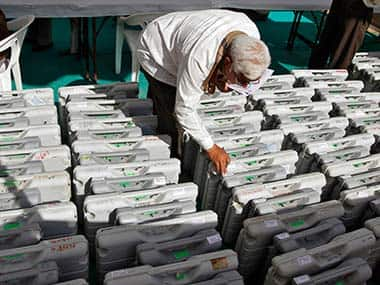The executive and the judiciary have been at loggerheads over the elevation of Justice KM Joseph — presently Chief Justice of the Uttarakhand High Court — as a Supreme Court judge ever since the Collegium of Judges of the apex court recommended his name.
Irked by the inaction of the Centre, members of the Kerala High Court Advocates' Association have expressed their "deep concern and anxiety" over the delay in forwarding Joseph's name to the President of India for his assent.
On Monday, the Kerala Bar association's general body unanimously passed a resolution for his appointment to the Supreme Court, which has been sent to Prime Minister Narendra Modi, Chief Justice of India Dipak Misra, and President Ram Nath Kovind.

File image of Justice KM Joseph. News18
The resolution noted that the Collegium recommended Joseph's name for elevation in its meeting on 10 January, and added that even after a lapse of over a month, the Union government had not taken any action.
"It noted that Joseph, a judge known for his "integrity, honesty, knowledge in law and independent discharge of his judicial duties", had discharged all his duties as a judge both in letter and in spirit..."
"Such qualities cannot become a taboo for the appointment of anyone, as a judge... No judge shall be allowed to suffer consequences, for being honest and fearless, in the discharge of his duties as a judge," the resolution read.
"The delay in forwarding the name of Justice Joseph is sending wrong signals to the institution, for judges being independent and fearless in the discharge of their constitutional functions," the resolution added.
Centre 'not keen' on Joseph
It has been widely reported that the Centre is not keen on giving its assent to Joseph's elevation. According to a Bar and Bench report, the issue seems to be limited to Joseph as the other recommendation made by the Collegium, of senior advocate Indu Malhotra — the first woman lawyer to be directly elevated to the Supreme Court from the Bar — faced no such resistance.
The Supreme Court Collegium seems to be cognisant of the government's resistance, according to this report in The Print: "We knew there was a possibility that the government could use some excuse not to process the name (of Joseph). That is why it was decided to recommend only one name from among eligible high court chief justices," a member of the collegium was quoted as saying by the report. "The majority of members of the collegium felt that the government should clear his name first before fresh recommendations are made," the member added.
According to a report in The Indian Express, the government, citing "disregard for seniority and regional representation", could consider returning the recommendation to the Collegium for "reconsideration".
Payback for Uttarakhand?
Incidentally, it was a bench headed by Chief Justice Joseph which, in April 2016, left the Centre embarrassed when it quashed the imposition of President’s Rule in Uttarakhand, The Indian Express report added. The court revived the Congress government of Harish Rawat, directing him to prove his majority on the floor of the House.
According to the Bar and Bench report, the Centre being reluctant to elevate Joseph is evident in the fact that, "The file recommending his transfer to the High Court of Judicature at Hyderabad almost two years ago has been relegated to some dusty cabinet in a law ministry office, where the government stores its discontent. An attempt to find the pulse of this document has borne little fruit, with the government revealing last year that it was 'still under consideration'."
The government’s argument is that elevating Joseph would mean giving "seniority and regional representation a go-by." However, as this Firstpost article argues, it may be time to rethink on the role of 'seniority' in Supreme Court appointments:
"The question of finally deciding on seniority and regional representation ought to take a backseat to how the Supreme Court Collegium views the merit and skill of a particular judge. In fact, in the recent past, there have been a lot of younger judges appointed to the court, including appointees from the Bar. In this round of recommendations as well, there is a Bar appointee, Indu Malhotra, who has also been recommended for elevation."
The judiciary's stand and the Centre's pushback raises a pertinent question: What will the Supreme Court Collegium do if the Centre again decides to defer Joseph's appointment?
Read the complete resolution here:
Published Date: Feb 19, 2018 19:49 PM | Updated Date: Feb 19, 2018 19:53 PM

